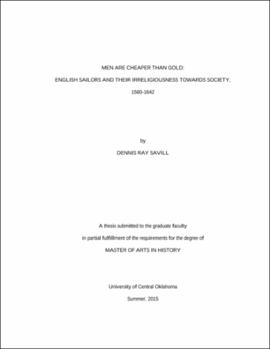| dc.description.abstract | The English common sailor rose from his humble beginnings to the pinnacle of renown and fame during the repulsion of the Spanish Armada in 1588. Afterwards, with the rise of the privateer and the merchant ships, the Royal Navy found it difficult to retain quality mariners. Following many decades of deriding and dehumanizing the tar, the men engendered and reproduced an attitude of irreligiousness towards religion in general and Christianity in particular, mocking the officers who represented the society, which denigrated them. This paper will explore the practices and transmission types of this irreligiousness and the way the state attempted to utilize the seamen to extend their power while simultaneously minimizing their importance to society. Using mainly sailor memoirs or pamphlets from the period, the paper also examines how contemporary historians and those of successive generations viewed the irreligiousness of the seamen. In the mid-sixteenth century, authorities initiated intensive regulations and discipline, which historians later labeled as Biopower, in shaping and controlling the behavior of the British sailor for the good of the state, which in turn led the men to exhibit agency, in the forms of irreligiousness, employment choice, and their very lifestyle, in resisting this drive to become high society's view of British. In due course at the beginning of it all, the hypocrisy of the established society juxtaposed against the sailor who enjoyed life to the fullest in an attempt to handle the stresses of this never before seen deep sea lengthy voyages demonstrates two differing tales of this early age of sail for the English. One story depicts the dashing officer rallying men onward to capture the prize or prevail against the raging storm, afterwards asking all to bow their heads as they thanked God for their deliverance. This same yarn shows the exasperated lieutenant, trudging from tavern to brothel, searching for the able but alcoholic tar and beseeching him to sign on for a voyage, for his own good, so he could attain some money for himself and perhaps his future. The other tale relates overbearing officers, usually hapless but mostly cruel, looking for their own gain on the backs of sailors and slaves, all the while committing the same kinds of acts he admonished the men for doing. The truth, as anyone looking back over so many centuries and relying on manuscripts and journals can detect, most likely resides somewhere in the middle but probably nearer to the cruel officer theme. British society did engage in applying Biopower to controlling the sailors and that the seamen used agency in their irreligiousness to fight back. This paper shines a light on an aspect of mariner agency that has been often overlooked. Their very lifestyles and indifference to prudent living such as savings, church-going, and other forms of high society shows they fought against the system which sought to control them with their very lives and minds. | |
